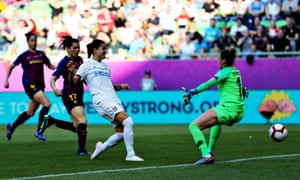Dzsenifer Marozsán says she has only learned to properly enjoy playing football since recovering from a life-threatening pulmonary embolism but the Germany playmaker has always made the game look fun.
The blood clot in a lung which briefly threatened Marozsán’s career has left her wearing compression stockings when travelling between matches but her exceptional talent continues to thrive in the tightest spaces. Few coaches can devise the sort of tactical tourniquet capable of stifling her creativity.
At least Phil Neville has been adequately warned about the threat awaiting his Lionesses from Germany’s midfield on Saturday. During the summer’s World Cup in France, England’s coach described Lucy Bronze as “the world’s best female footballer” but his right-back was quick to correct him.
“It’s Dzsenifer Marozsán,” said Bronze, identifying her Lyon teammate, roommate and good friend. “She’s the world’s best player. It’s a lovely compliment from Phil but I don’t believe him. You rarely see anyone with as much ability as Dzsenifer.
“The only player I could really compare her to is Kelly Smith. Dzsenifer’s just got so much raw talent; I’ll never be able to hit a ball like she does. She’s so tricky and skilful. I love Marozsán.”
Purists have long adored an attacking midfielder expert at operating “between the lines” but she is also big on end-product; her 96 international games have produced 32 goals.
Born in Budapest, Marozsán moved to south-west Germany as a small child when her professional footballer father, Janos – capped four times by Hungary – signed for FC Saarbrücken and they settled close to the French border.
Once Marozsán’s talent with the ball at her feet became apparent, the German football federation encouraged her to switch allegiances, eventually nationalising the whole family. At the age of 14 years and seven months she made her first-team debut for Saarbrücken women, before, at 15, becoming the youngest player to appear in the female Bundesliga.
Now 27, the No 10 made a full international debut in 2010, subsequently helping her adopted country win Euro 2013 in Sweden and securing Olympic gold in Brazil three years later.
Marozsán has won the Women’s Champions League four times, initially with Frankfurt and three times with Lyon. She believes moving to France’s elegant second city three years ago has “improved” her “as a person” and, after some initial struggles, is proud of achieving fluency in French. “I feel completely at home in Lyon,” she says. “The food’s completely amazing. I’ve eaten more cheese in the past three years than in my entire life.”
However, in the summer of 2018 her entire future was threatened when she suffered that pulmonary embolism. Despite being ultimately sidelined for only three months and ending the season lifting three domestic trophies, for a while there were genuine fears Marozsán might never play again.
“It really wasn’t a nice situation,” she says. “I was in pain and had to go to hospital. The first moment you’re diagnosed with a lung embolism you’re shocked, your family’s shocked and the worst thoughts go through your head.

“After a week, though, it became clear I would fight back. I got a lot of support which gave me courage and strength and, now, I’m just happy to be back on the pitch.
“When you’ve been in this situation you realise how important it is to enjoy every day, because it can happen any day. So I’m really calm now. If I get a little injury, I say to myself: ‘There are a lot of worse things. Be calm and you’ll be fine soon.’ Now I just enjoy every moment.”
It seems such pleasure has been enhanced by Marozsán’s decision to relinquish the captaincy given to her by the former national coach Steffi Jones. Even so, she continues to be an unofficial dressing-room leader, using her experience to quietly – she is not a shouter or finger-pointer – bring the best out in a young, still somewhat transitional squad.
“You need characters who go out and win a game, who take the lead and the responsibility,” says Germany’s coach, Martina Voss-Tecklenburg. “Players who’ll look you in the eye when things are rough and tell you what’s what.”
It seems a case of what might have been had Marozsán been fit for Germany at the past three World Cups. In 2011 a knee injury sidelined her and although she travelled to Canada 2015, ankle trouble restricted the playmaker’s contribution to the run to a third-place play-off defeat by England. France 2019, meanwhile, was wrecked by a broken toe, limiting her involvement as Sweden beat Voss-Tecklenburg’s side in the quarter-finals.
The bad news for England is that a creative catalyst Neville regards as an international role model is expected to grace Wembley in peak condition.
Bev Priestman, his assistant, recently watched Lyon train and returned full of admiration. “Bev said Marozsán gets five mannequins, puts them out on the pitch and starts practising free-kicks on her own,” says England’s coach. “That’s the behaviour of an elite player.”
With WSL clubs restricted by a wage cap – only 40% of turnover can be spent on player remuneration – English clubs are unlikely to be able to afford Marozsán any time soon so Saturday will offer fans a rare glimpse of her balletic grace in action.
Source link

